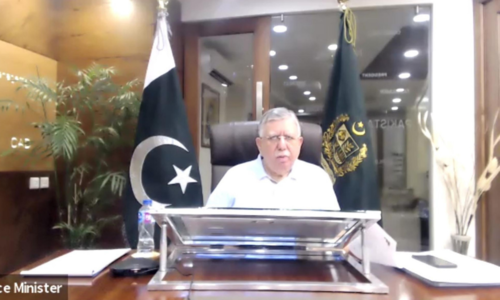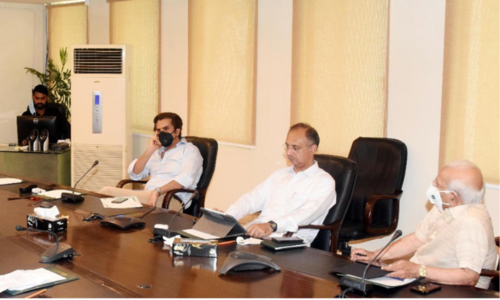• Face-to-face talks with IMF to be held in October
• Growth rate to be raised to 6pc in three years
• Massive job opportunities to be generated
ISLAMABAD: With the commitment not to exit the International Monetary Fund (IMF) programme and instead take it to face-to-face talks in Washington in October, Finance Minister Shaukat Tarin on Friday unveiled another short-, medium- and long-term economic programme for 14 key sectors to ensure sustainable growth.
Speaking at a news conference with eight cabinet colleagues and private sector members of the Economic Advisory Council (EAC), Mr Tarin also said the logjam on the Pakistan Steel Mills had been removed and bidders would be invited in a couple of days for its formal privatisation process.
He said Pakistan’s planning-based economic policy had come to an end two decades ago, resulting in repeated boom-and-bust cycles. However, the new plan would set the stage for inclusive and sustainable growth. He said that based on these workable plans along with strategy, every minister would stand before the prime minister on a monthly basis to report progress and be answerable for slippages.
Replying to a question about economic plans announced by the government when it came to power three years ago and the promises about review of performance of ministers promised by the prime minister, Mr Tarin said he should not be made answerable about the outcome of similar plans announced by the government when it came to power three years ago and performance review of ministers.
He said Asad Umar as finance minister had made an attempt in this direction but could not follow up as he moved out “but let me assure you we have made a plan and we will implement it and report progress to you on a monthly basis”.
He said the Economic Reforms Unit of the Ministry of Finance would coordinate the progress review before the prime minister and the Pakistan Institute of Development Economics would provide experts to assist in professional reviews.
Responding to another question about the timing of the new expansionary moves and if this would be deliverable while the government was in IMF programme or it wanted to quit the programme, he said the government did not have any intention to get out of the IMF programme. The minister said he had held positive discussions with the IMF on Thursday and agreed to have discussions on next review by end of next month and then “I will hold face-to-face discussions with IMF in Washington” during October 11-17 annual meetings.
Mr Tarin said performance in 14 sectors would be monitored from September and the prime minister would be given briefing about the execution of the plans every month. “Hence plans do not focus only on devising strategies but also on ensuring implementation which is a major break with the past practice,” he said. He said obviously the incumbent government would be able to implement only short-term actions, some of which had already been included in the current year’s budget, but it would stage the stage for coming governments to follow.
The broad objectives of the plan include accelerating the overall economic growth rate from 3pc to 6pc in the next three years without creating pressure on balance of payments and by keeping inflationary expectations subdued. It also includes increasing tax to GDP ratio by 1.5 to 2pc annually, attaining target of $30 billion exports by FY 2023-24 and keeping up the momentum in foreign remittances.
The key focus is to generate massive employment opportunities over the period of time to engage the youth in productive sectors of the economy.
The sectors underlined for driving growth through the platform of the EAC are agriculture, including small farms, micro enterprises, small and medium enterprises, construction, tourism and information technology. This would be achieved through coherent, consistent and well-coordinated polices between the federal, provincial governments and the private sector, Mr Tarin said.
Adviser to the PM on Institutional Reforms Dr Ishrat Hussain said the roadmap would ensure export-led growth and strengthen local government system as the devolution process under the 18th Amendment and seventh National Finance Commission award had not been completed.
The medium and long-term agenda includes a multi-pronged strategy for institutional reforms in the public sector and the provincial governments will prioritise achieving universal access to quality education, health, access to drinking water and sanitation.
Similarly, the federal and provincial governments would enhance focus on human development and develop physical infrastructure which is lagging behind in far-flung areas. The medium-to-long term planning also includes completion of China-Pakistan Economic Corridor projects, particularly in agriculture, industrial cooperation, socio-economic development and financial inclusion.
It also includes utilisation of special technology zones, IT parks and incubation and entrepreneurships centres that complement CPEC investments.
In the sphere of power and energy, the long-term planning encompasses implementing Renewable Energy Policy and National Power Policy to attain the goal of 60 per cent energy generation from non-fossil fuels, including hydro-power generation.
The finance minister said a positive sentiment had been generated about the economy and this would be built upon with the advisory and capacity enhancement role of the EAC to create synergies across different sectors, facilitate active monitoring and pave way for sustained institutional reforms and modernisation of the public sector.
The plan for resolving the circular debt issue includes reducing the cost of electricity generation by flattening the capacity payment curve through restructuring power producers. This will be done through a combination of re-profiling of project debts and reduction in return on equity and operation and maintenance components of tariffs.
At the same time, steps will be taken to boost demand for grid electricity by incentivising captive-to-grid shift and integration of NTDC-KE networks. It will also include replacing cross-subsidies with direct subsidies, lowering tariffs for high consumption categories, targeting price deregulation and improving governance through engagement with the private sector.
A multi-faceted and multi-dimensional price stability strategy will be that farmers will be offered price guarantees and confirmed off takes to protect them from exploitation at the hands of wholesalers and middleman.
Investment through public-private partnership will be invited to develop multi-purpose storage facilities for maintaining strategic reserves. Moreover, small markets will be built close to production clusters and air transport could be utilised to give farmers direct access to the far-flung domestic markets. This will ensure price stability in items of daily use.
Mohammad Ali Tabba said 10 new sectors had been identified which would generate $1bn exports in short-term to help take exports to $40-50bn.
Minister for National Food Security and Research Syed Fakhar Imam, Minister for Industries Khusro Bakhtiar, Adviser to the PM on Commerce Abdul Razaq Dawood, Sultan Ali Allana, Arif Habib and Salim Raza also spoke at the press conference.
Published in Dawn, August 28th, 2021













































